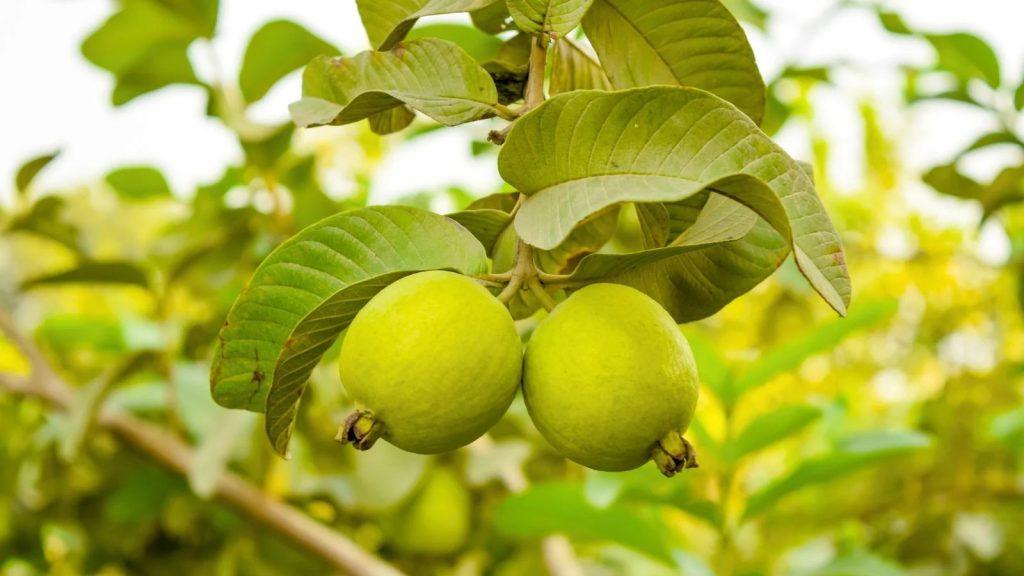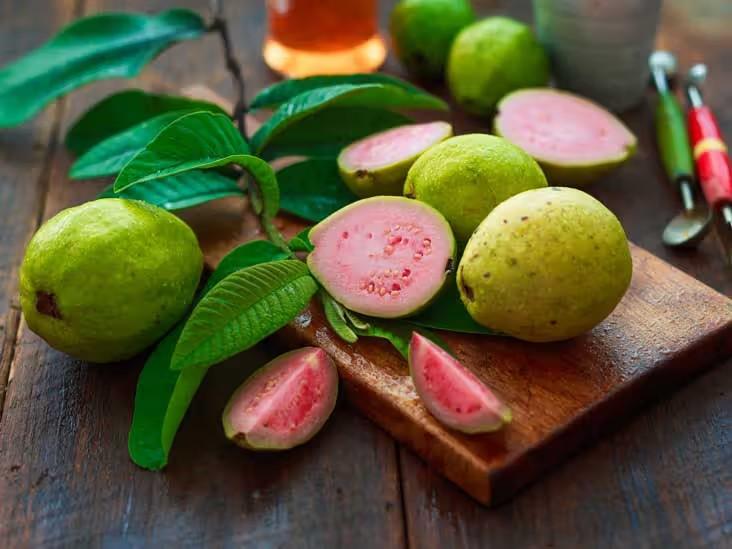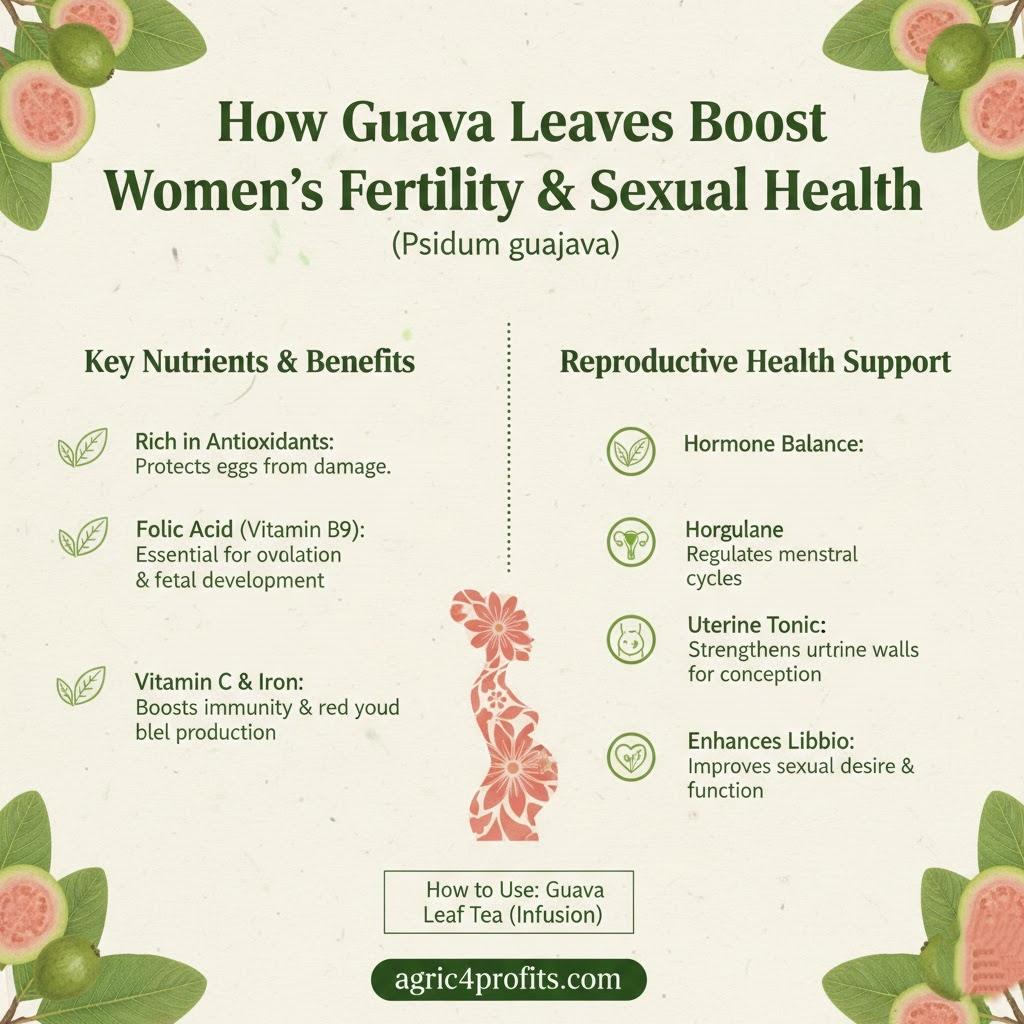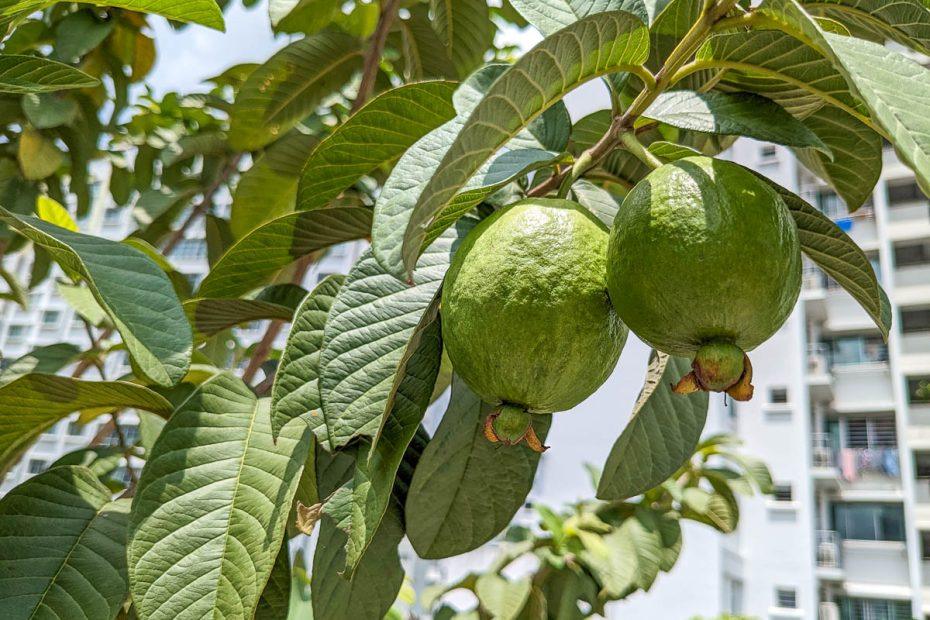Guava leaves, derived from the guava tree (Psidium guajava), are often overlooked despite their rich history and extensive uses in various cultures around the world. Known primarily for their delicious fruit, the guava tree also yields leaves that possess a wealth of health benefits, particularly in spiritual practices and fertility enhancement.
These leaves have been a part of traditional medicine for centuries, particularly in tropical regions where guava trees thrive, such as Central and South America, the Caribbean, and parts of Asia.
The guava tree itself is a hardy plant that bears fragrant flowers and produces small, round or pear-shaped fruits that are beloved for their sweet flavor and nutritional value. However, it is the leaves that hold particular significance in both health and spiritual contexts.
Rich in antioxidants, vitamins, and minerals, these leaves are packed with beneficial compounds that contribute to their medicinal properties. They contain high levels of vitamin C, flavonoids, and tannins, which are known for their anti-inflammatory and antimicrobial effects.
In traditional medicine, guava leaves are often brewed into a tea or used as an infusion to promote overall health. This herbal infusion is celebrated for its potential to aid digestion, improve skin health, and manage diabetes by regulating blood sugar levels.
The soothing properties of these leaves can also alleviate gastrointestinal issues, making them a popular remedy for diarrhea and other digestive disorders. However, beyond their physical health benefits, guava leaves are deeply intertwined with spiritual practices and fertility.
Many cultures regard these leaves as sacred, associating them with purification and protection. In various spiritual traditions, they are used in rituals to cleanse spaces and individuals of negative energies or impurities. The leaves are sometimes burned or placed in sacred spaces as an offering to invoke blessings and ward off misfortune.
The aromatic smoke produced when burning guava leaves is believed to carry prayers and intentions to the spiritual realm, fostering a connection between the physical and metaphysical worlds. This spiritual significance highlights the role of these leaves not just as a herbal remedy but also as a medium for spiritual expression and connection.
Fertility is another area where guava leaves have been traditionally revered. Many cultures believe that the leaves possess properties that can enhance reproductive health and support fertility in both men and women.
The leaves are thought to help balance hormones, regulate menstrual cycles, and improve overall reproductive function. For women, the nutrients found in guava leaves, such as folate and vitamin C, play a critical role in supporting reproductive health.
Folate is essential for DNA synthesis and repair, making it particularly important for women who are trying to conceive or are in early pregnancy. By ensuring that the body is well-nourished, guava leaves may help create an optimal environment for conception and healthy fetal development.
Men, too, can benefit from the fertility-enhancing properties of guava leaves. Research has indicated that the antioxidants in the leaves can improve sperm quality and motility, which are crucial factors in male fertility.

By reducing oxidative stress and inflammation in the body, guava leaves may help enhance reproductive health and support the journey toward conception. Additionally, the consumption of guava leaf tea or extracts is often recommended for couples trying to conceive, as it may improve the chances of successful fertilization and a healthy pregnancy.
Moreover, the connection between guava leaves and spirituality extends to their role in rituals aimed at enhancing fertility. In various cultures, the leaves are incorporated into ceremonies and blessings intended to promote conception and a healthy pregnancy.
Women seeking to conceive may wear guava leaves or place them under their pillows as a form of spiritual protection and a call for fertility blessings. This blend of physical and spiritual practices highlights the multifaceted approach that many cultures take when it comes to fertility, integrating both health and spiritual well-being.
In addition to their direct benefits on fertility and spiritual practices, guava leaves also support overall well-being, which is essential for anyone on a fertility journey. A balanced diet, rich in antioxidants and nutrients, can help reduce stress and improve general health, both of which are vital for optimal reproductive function.
The anti-inflammatory properties of guava leaves may also play a role in reducing stress on the body, further supporting reproductive health and spiritual balance. While guava leaves offer numerous benefits, it is essential to approach their use with mindfulness and respect for traditional practices.
Consulting with herbalists or health professionals knowledgeable about natural remedies can provide valuable guidance on incorporating guava leaves into a holistic approach to health and fertility. Additionally, understanding the cultural significance and spiritual practices associated with these leaves can enhance the overall experience of using them for health and well-being.
How Guava Leaves Enhance Women’s Fertility and Sexual Health

The role of guava leaves in enhancing reproductive health is gaining attention in contemporary health discussions, as more women seek natural remedies to support their reproductive systems.
One of the primary ways these leaves support fertility is through their ability to regulate menstrual cycles. A consistent menstrual cycle is crucial for fertility, as it indicates a woman’s hormonal balance and reproductive health.
Guava leaves contain flavonoids and tannins, which may help in regulating hormonal fluctuations. This regulation is essential for promoting ovulation and increasing the chances of conception.
Many women have reported more regular menstrual cycles after incorporating guava leaf tea into their daily routine, highlighting the leaves’ potential to enhance reproductive health.
Guava leaves are also rich in folate, a vital nutrient for women, especially those trying to conceive. Folate is essential for DNA synthesis and repair, which is critical for fetal development during pregnancy.
Adequate folate levels can prevent neural tube defects and support the overall health of the developing fetus. Consuming the leaf as a tea or in other preparations can help ensure that women receive sufficient folate, thereby promoting healthy pregnancy outcomes.
The high vitamin C content in the leaves further enhances their nutritional profile, supporting immune function and overall health during the conception process. Additionally, the leaves have potent antioxidant properties that play a significant role in improving sexual health.
Oxidative stress can negatively impact reproductive health by damaging eggs and sperm, leading to fertility issues. The antioxidants present in guava leaves combat oxidative stress, helping to protect reproductive cells from damage.
By maintaining healthy cells, guava leaves may improve egg quality, which is essential for successful conception. This protective effect extends to women’s overall sexual health, contributing to a healthier reproductive system.
Another critical aspect of women’s reproductive health is the regulation of blood sugar levels. Guava leaves have been shown to help manage blood sugar levels effectively. Stable blood sugar levels can reduce the risk of insulin resistance, a condition that can affect hormone levels and menstrual cycles.
By drinking guava leaf tea, women may experience better hormonal balance, leading to improved fertility. Furthermore, managing blood sugar levels can help prevent weight gain and metabolic issues, which are linked to fertility challenges.
Moreover, these leaves possess anti-inflammatory properties that can benefit women’s reproductive health. Inflammation in the body can interfere with ovulation and hormone production, leading to irregular cycles and fertility challenges.
The anti-inflammatory compounds in guava leaf help to reduce inflammation in the reproductive system, supporting a healthy environment for conception. This reduction in inflammation can also enhance blood flow to the pelvic area, promoting healthy ovarian function and improving sexual health.
For women experiencing symptoms of conditions such as polycystic ovary syndrome (PCOS), guava leaves can be particularly beneficial. PCOS is a common hormonal disorder that can disrupt menstrual cycles and lead to fertility issues.
The use of these leaves may help regulate menstrual cycles, improve insulin sensitivity, and reduce inflammation, addressing several underlying factors associated with PCOS. As a result, incorporating guava leaves into the diet can be a natural way to support reproductive health in women affected by this condition.
Additionally, guava leaves are known for their aphrodisiac properties. In various cultures, these leaves have been used to enhance sexual desire and improve overall sexual health.
The rich nutrient content of guava leaves supports increased blood circulation and enhances libido, which can positively impact sexual relationships. Women looking to enhance their sexual health may find that consuming guava leaves can help boost their sexual desire and performance.
The spiritual aspect of guava leaves should not be overlooked. In many cultures, these leaves are used in rituals and practices aimed at promoting fertility and sexual health.
Women may use guava leaves in ceremonies to invoke blessings for fertility or to seek protection during pregnancy. This spiritual connection can enhance the overall experience of using guava leaves for health, providing a sense of empowerment and holistic well-being.
To incorporate guava leaves into a daily routine, women can brew guava leaf tea by steeping fresh or dried leaves in hot water for about 10-15 minutes. This tea can be enjoyed hot or cold, and sweetened with honey or lemon if desired. Some women also use guava leaves in smoothies or as a seasoning in various dishes.
Regardless of the method, regular consumption of guava leaves can contribute to overall reproductive health and well-being. While guava leaves offer numerous benefits for women’s fertility and sexual health, it is essential to approach their use with awareness and respect for traditional practices.
Consulting with healthcare providers knowledgeable about herbal remedies can provide valuable guidance on the proper use of guava leaves. Understanding the cultural significance and potential effects can enhance the experience of incorporating these leaves into a holistic approach to health.
Read Also: Uses and Benefits of Cocoyam
When and How to Use Guava Leaves for Optimal Results

These leaves are frequently used in traditional medicine to promote overall health. Knowing when and how to use them effectively can help enhance their benefits and ensure the best results. Here’s a guide to using guava leaves.
A. Understanding the Nutritional Profile
Guava leaves are high in vitamin C, flavonoids, tannins, and other beneficial compounds. These elements give them antioxidant, anti-inflammatory, and antimicrobial properties. Regular consumption can support the immune system, improve digestive health, and benefit skin wellness.
B. When to Use Guava Leaves
1. Digestive problems: If you suffer from digestive problems like diarrhea or bloating, guava leaves can offer relief. They have astringent properties that can tighten the intestines and decrease the frequency of bowel movements. Drinking guava leaf tea during these episodes can soothe your digestive system.
2. Blood sugar management: For those managing blood sugar levels, guava leaves can be a helpful addition to your diet. Research shows they can help regulate blood glucose levels, which is beneficial for individuals with diabetes or insulin resistance.
3. Skin issues: If you experience skin issues like acne, rashes, or irritation, these leaves can also provide benefits. Their antimicrobial properties help fight bacteria and promote healing. Applying them topically can reduce inflammation and lead to clearer skin.
4. Fertility support: Women trying to conceive may find guava leaves useful as well. The nutrients they contain support hormonal balance and can help regulate menstrual cycles, promoting reproductive health.
5. Weight management: If you are aiming to manage your weight, including guava leaves in your routine may help. They can support digestion and fat metabolism, making them a good choice for those looking to lose weight.
C. How to Use Guava Leaves
a. Guava Leaf Tea: Making tea is one of the most popular ways to consume these leaves. To prepare guava leaf tea, follow these steps:
- Take 10-15 fresh leaves or 3-5 dried ones.
- Wash the leaves thoroughly to remove dirt.
- Boil about 4 cups of water in a pot.
- Add the leaves to the boiling water and let it steep for 10-15 minutes.
- Strain the leaves and enjoy the tea. You can add honey or lemon for flavor if desired.
Drinking this tea regularly can help improve your health and address specific issues such as digestive problems and blood sugar control.
b. Topical Application: For skin problems, guava leaves can be applied directly. To do this:
- Crush a few fresh leaves to extract the juice.
- Apply the juice to the affected area of the skin.
- Leave it on for about 30 minutes before rinsing with warm water.
This method can soothe irritation and aid healing for acne, rashes, and other skin concerns.
c. Infused Water: Another simple way to consume guava leaves is by infusing them in water.
- Place a few fresh or dried leaves in a pitcher of water.
- Allow the mixture to sit for several hours or overnight in the refrigerator.
- Drink the infused water throughout the day for hydration and health benefits.
This method is a great way to add guava leaves to your diet without needing to brew tea.
d. Guava Leaf Powder: You can also grind dried leaves into a fine powder and mix it into smoothies, yogurt, or other dishes. This provides a concentrated source of nutrients and can easily fit into your diet.
D. Optimal Dosage and Frequency
To get the best results, it’s important to consume guava leaves in moderation. For guava leaf tea, drinking 1-2 cups daily is generally recommended. If using them topically, you can apply the leaves 2-3 times a week, depending on your skin condition. If you use the leaves in powdered form, start with 1-2 teaspoons per day and adjust as needed. As with any herbal remedy, pay attention to your body and consult a healthcare professional if you have concerns or specific health issues.
E. Potential Precautions
While guava leaves are generally safe for most people, it’s essential to take some precautions. Pregnant or breastfeeding women should consult a healthcare provider before using these leaves, as their effects during these periods are not fully understood. Additionally, those taking medications for diabetes should closely monitor their blood sugar levels when using guava leaves, as they may enhance the effects of blood sugar-lowering medications.
Read Also: Health Benefits and Uses of Utazi Leaf
Summary of Guava Leaves Benefits for Fertility and Health

| Aspect | Key Details |
|---|---|
| Source | Leaves from guava tree (Psidium guajava) |
| Nutritional Profile | High in vitamin C, folate, flavonoids, tannins, antioxidants |
| General Health Benefits | Aids digestion, manages blood sugar, reduces inflammation, improves skin health, antimicrobial effects |
| Fertility Benefits (Women) | Regulates menstrual cycles, balances hormones, improves egg quality, supports ovulation, aids PCOS management, enhances libido |
| Fertility Benefits (Men) | Improves sperm quality and motility via antioxidant protection |
| Spiritual Uses | Purification, protection, rituals for fertility blessings, burning for cleansing negative energy |
| Preparation Methods | Tea (most common), topical application, infused water, powder in food |
| Usage Tips | 1-2 cups tea daily; moderate consumption; consult professionals |
| Precautions | Consult doctor if pregnant, breastfeeding, or on diabetes meds |
Frequently Asked Questions on Guava Leaves and Fertility
1. What nutrients in guava leaves benefit women’s fertility?
Guava leaves are rich in essential nutrients like vitamins C and B, folate, and antioxidants. These nutrients play a significant role in promoting hormonal balance, supporting ovulation, and enhancing overall reproductive health, which is beneficial for women trying to conceive.
2. How do guava leaves help regulate menstrual cycles?
These leaves contain flavonoids and tannins that may help balance hormones and regulate menstrual cycles. By promoting hormonal stability, guava leaves can support regular ovulation, increasing the chances of conception.
3. Can guava leaves improve egg quality?
Yes, the antioxidants found in guava leaves combat oxidative stress, which can damage eggs and impair fertility. By protecting reproductive cells, they may contribute to improved egg quality, essential for successful conception.
4. Are guava leaves beneficial for managing blood sugar levels?
Absolutely. Guava leaves have been shown to help regulate blood sugar, which is crucial for women with insulin resistance or conditions like polycystic ovary syndrome (PCOS). Stable blood sugar levels can enhance hormonal balance and fertility.
5. How can guava leaves be consumed for optimal benefits?
These leaves can be consumed in various forms, including tea, infused water, or in powdered form added to smoothies. Regularly drinking guava leaf tea can maximize their benefits for reproductive health.
6. Is there scientific research supporting the benefits of guava leaves for fertility?
While traditional medicine has long recognized these leaves’ benefits, more scientific research is needed to understand their effects on fertility and sexual health. However, existing studies suggest that the antioxidants and nutrients can positively impact reproductive health.
7. Can guava leaves help with conditions like PCOS?
Yes, guava leaves may help manage symptoms associated with PCOS, such as irregular menstrual cycles and insulin resistance. By promoting hormonal balance and reducing inflammation, they can support reproductive health.
8. How can I incorporate guava leaves into my daily routine?
You can include guava leaves by brewing tea, adding powdered leaves to smoothies, or infusing water with fresh leaves. Regular consumption can help you reap the benefits and support fertility and sexual health.
9. Are there any side effects of using guava leaves?
Guava leaves are generally safe in moderation, but excessive use may cause mild digestive upset. Pregnant or breastfeeding women and those on certain medications should consult a healthcare provider first.
10. Can men also benefit from guava leaves for fertility?
Yes, the antioxidants in guava leaves can reduce oxidative stress, potentially improving sperm quality, motility, and overall male reproductive health.
Do you have any questions, suggestions, or contributions? If so, please feel free to use the comment box below to share your thoughts. We also encourage you to kindly share this information with others who might benefit from it. Since we can’t reach everyone at once, we truly appreciate your help in spreading the word. Thank you very much for your support and for sharing!
Disclaimer: This article is for educational and informational purposes only. The health benefits described are based on scientific research and traditional knowledge. They ayre not a substitute for professional medical advice, diagnosis, or treatment. Always consult a healthcare professional before using any herb or natural remedy for medical purposes.
Read Also: Onions Farming Complete Business Guide

